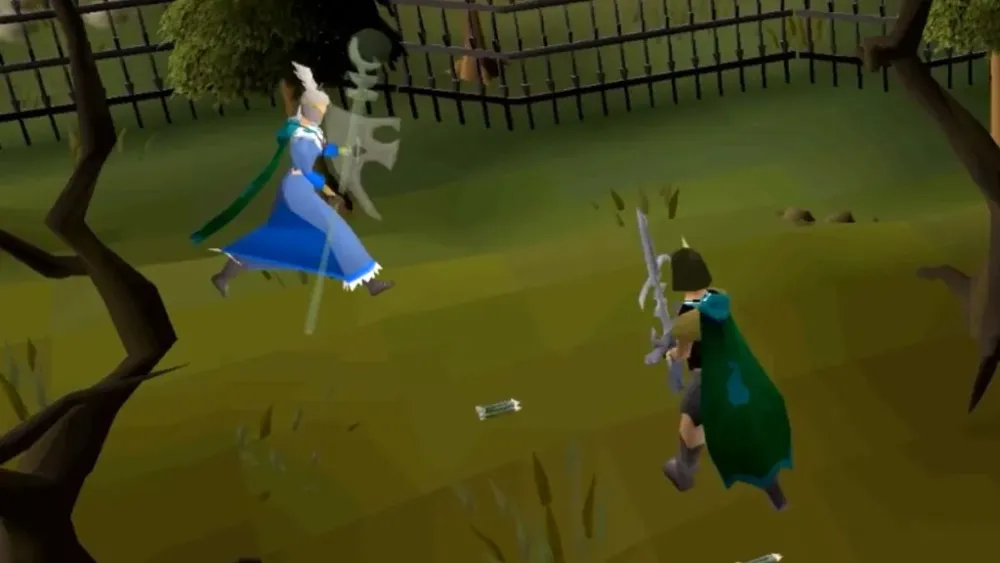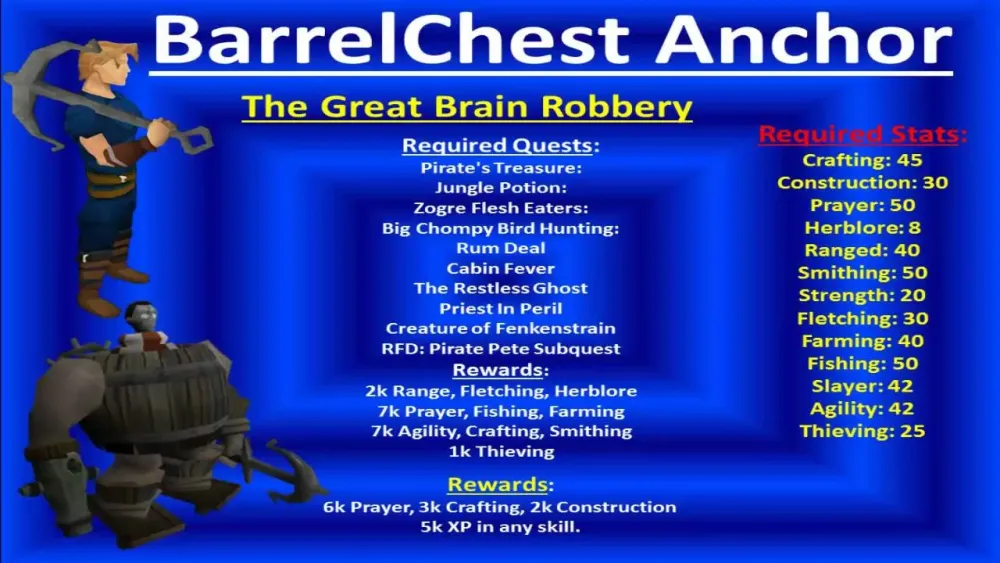Your cart is empty
The Ultimate Guide to the Order of Quests in OSRS

Old School RuneScape (OSRS) offers a rich tapestry of quests that enhance the gameplay experience, providing players with stories, challenges, and rewards. Quests not only serve as a means to progress through the game but also unlock new areas, skills, and items. Understanding the quest system is essential for both new and veteran players aiming to maximize their enjoyment and efficiency in the game.
The order in which players undertake quests in OSRS is crucial for several reasons. Firstly, certain quests are prerequisites for others, meaning that players must complete specific quests to unlock subsequent ones. This can significantly affect gameplay progression, as some quests provide essential skills, items, or access to new regions that are necessary for later challenges.
Moreover, the order of quests can impact the efficiency of leveling up skills. Many quests reward players with experience in different skills, and strategizing the order can help players achieve their goals faster. For example, completing quests that grant experience in combat skills early on can prepare players for tougher quests and boss fights later in the game.
Additionally, some quests are designed to be more challenging and may require higher-level skills or better gear. Players often benefit from completing easier quests first, as these can provide valuable rewards and experience that make subsequent quests more manageable. By prioritizing quests based on difficulty and rewards, players can create a smoother progression path and enjoy a more satisfying gaming experience.
Finally, understanding the quest order helps players avoid unnecessary backtracking. In OSRS, players frequently travel between different locations to complete quest objectives. By following a logical quest order, players can save time and resources, making their overall gameplay more efficient and enjoyable.
3. Key Quest Requirements

Understanding the key requirements for quests in Old School RuneScape (OSRS) can significantly enhance your gaming experience. Quests are not just about completing tasks; they often require certain skills, items, or levels. Below, we break down the essential requirements that players should keep in mind:
- Skill Levels: Many quests demand specific skill levels. For instance, if you want to start the quest “Animal Magnetism,” you’ll need a minimum level of 18 in the Hunter skill.
- Item Requirements: Some quests require you to have specific items in your inventory before you can begin. For example, “The Restless Ghost” requires a Ghostspeak Amulet.
- Quest Pre-requisites: Certain quests can only be attempted after completing other quests. For example, to start “Plague City,” you must have completed “The Biohazard” quest first.
- Combat Levels: Some quests involve battles against monsters, so a decent combat level is often necessary. Quests like “Dragon Slayer” can be challenging without a combat level of at least 30.
Before diving into any quest, check these requirements thoroughly. You can find a complete list of requirements for each quest in the OSRS Wiki, which is a fantastic resource for planning your adventure!
4. Recommended Quest Order for Beginners

Starting your questing journey in OSRS can be overwhelming given the vast number of quests available. To make things easier, here’s a recommended quest order for beginners. This sequence helps in gaining essential skills, unlocking useful features, and making your gameplay smoother:
| Quest | Requirements | Rewards |
|---|---|---|
| Cook’s Assistant | None | Cooking XP, access to the Lumbridge Castle kitchen |
| The Restless Ghost | None | Prayer XP, Ghostspeak Amulet |
| Animal Magnetism | 18 Hunter, 31 Range | Access to the Ava’s Device, Hunter XP |
| Plague City | Biohazard | Access to West Ardougne, Agility XP |
| Dragon Slayer | 30 Combat, 32 Quest Points | Access to the anti-dragon shield, 18,650 XP |
Following this order will help you build a solid foundation in OSRS. Each completed quest opens up new opportunities and strengthens your character, making your journey even more enjoyable!
5. Intermediate Quest Pathways
When you’ve tackled the basics in Old School RuneScape (OSRS), it’s time to dive into the intermediate quests. These quests often bridge the gap between the simpler tasks and the more complex challenges that lie ahead. They introduce new mechanics, skills, and even lore, making them essential for any aspiring adventurer.
Key Intermediate Quests:
- Animal Magnetism: This quest is crucial for players looking to unlock the ability to use the Ava’s Device, which helps in retrieving ammunition.
- Fairytale I – Growing Pains: It sets the stage for the fairy tale series and provides access to fairy rings, which are excellent for fast travel.
- The Depths of Despair: This quest introduces players to the Waterbirth Island area and is a prequel to some more advanced quests.
Completing these intermediate quests not only enhances your character’s skills but also opens up new areas and resources. Here are some benefits:
- Skill Unlocks: Many intermediate quests reward you with experience in crucial skills.
- Access to New Areas: Some quests unlock previously inaccessible areas, allowing for further exploration.
- New Items: Completing these quests often grants unique items that can aid in combat or skilling.
Overall, the intermediate quest pathways are designed to enhance your gameplay experience. As you progress, you’ll find that these quests not only enrich your character but also deepen your understanding of the game’s lore.
6. Advanced Quests and Their Importance
Once you’ve mastered the intermediate quests, it’s time to tackle the advanced quests in OSRS. These quests are not just about the challenge; they offer significant rewards and are often critical for high-level gameplay. Advanced quests tend to require a combination of high skill levels, extensive knowledge of the game, and sometimes, teamwork.
Notable Advanced Quests:
- Monkey Madness II: This quest is essential for unlocking the ability to use the powerful Greegree items, which provide unique transformations.
- Dragon Slayer II: A sequel to the original Dragon Slayer quest, it allows players to wield the powerful Dragon equipment.
- Desert Treasure: This quest is vital for unlocking the Ancient Magicks spellbook, a game-changer for magic users.
The importance of advanced quests can be summarized as follows:
- High-Level Rewards: They often provide significant experience boosts and access to powerful items.
- Game Mechanics: Many advanced quests introduce new mechanics that are crucial for end-game content.
- Quest Points: Completing these quests contributes to your total quest points, which can unlock additional benefits.
In conclusion, advanced quests are crucial for any serious OSRS player. They not only enhance your character’s abilities but also deepen your engagement with the game. So gear up, level up, and prepare for the challenges that await!
7. Questing Tips and Tricks
Embarking on quests in Old School RuneScape (OSRS) can be an exhilarating experience, but it can also be a bit overwhelming, especially for newcomers. Here are some practical tips and tricks to enhance your questing journey:
- Use a Quest Guide: Websites like the OSRS Wiki or dedicated questing guides provide step-by-step instructions. They can save you a lot of time and confusion.
- Prepare Your Inventory: Before starting a quest, check the requirements and gather necessary items. This includes food, potions, and any special items specified in the quest guide.
- Level Up Prior: Certain quests require specific levels in skills. It’s often wise to train your skills beforehand to avoid roadblocks.
- Join a Community: Engage with the OSRS community through forums or Discord. You can share experiences, ask questions, and even find questing buddies.
- Use the Quest Helper: If you’re a premium member, take advantage of the Quest Helper feature, which highlights important locations and objectives on your map.
- Stay Patient: Some quests can be challenging and may require multiple attempts. Don’t get discouraged; persistence is key!
By applying these tips, you can streamline your questing experience and enjoy the rich stories and rewards that come with them!
8. Conclusion: Mastering the Questing Experience
Questing in OSRS is not just about completing tasks; it’s about immersing yourself in the game’s lore, exploring new areas, and unlocking unique rewards. By mastering the art of questing, you’ll enhance your overall gameplay experience. Here are some final thoughts to consider:
| Key Takeaway | Importance |
|---|---|
| Engagement: Immerse yourself in the storyline. | Enhances enjoyment and investment in the game. |
| Preparation: Always come equipped for each quest. | Prevents interruptions and frustration. |
| Community: Leverage the OSRS community. | Gain insights and tips from experienced players. |
| Patience: Understand that some quests take time. | Fosters a better gaming mindset and resilience. |
In conclusion, questing is a fundamental aspect of OSRS that offers depth and excitement. By following the tips provided and embracing the questing experience, you’ll not only complete quests more efficiently but also enjoy the journey along the way. Happy questing!

